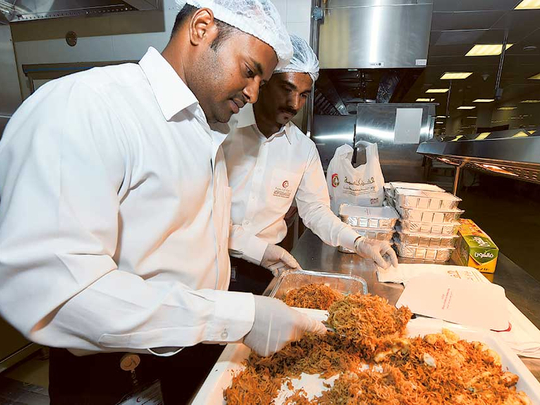
Abu Dhabi: Sumptuous iftar buffets at hotels and restaurants are popular during Ramadan, but they also raise food wastage concerns. But this does not have to be the case, if people commit themselves to eating only as much as they need at a buffet. A sense of collective responsibility from all stakeholders, from those providing the food to those enjoying it, will make a big difference in this matter.
Gulf News speaks with residents and people managing iftar venues to see how we can contribute to controlling food wastage.
Diana Coelho, Indian, over 60
Coelho has been living in Abu Dhabi for 38 years and has seen the increase in the number of iftar buffets over time. “The spreads are fantastic and many are good value for money. They are also a great way for corporate people to entertain their clients, but I feel there is a lot of food wastage,” she said.
Her own lifestyle and her concern for food wastage are key in determining whether to go to buffets. “The handful of times I have been to a buffet, I eat [mostly] salads because [it suits] my lifestyle. It doesn’t make sense for me to go to big buffets.”
She has seen food going to waste at such events, she said. “I saw many half-full plates left on tables. Such a waste, specially when there are people who don’t have enough food to eat.”
People should treat iftar buffets as they would treat dinners at home, Coelho said. “At home, we don’t put so much food on our plates that we can’t finish it, so why do that at an iftar?
“I think that because people think they have paid for a buffet, they should take as much [food] as they want even if they don’t eat it.”
Back in Mumbai, India, where she comes from, she knows of five-star venues that donate extra food from their buffets to orphanages. “It would be nice if we could see more food being given away to those who need it, responsibly and according to health and safety regulations.”
Mohammad Shehata, Egyptian, 31
The Abu Dhabi-based electrical engineer has been to a number of iftar buffets this Ramadan and while he does his best to serve himself only what he needs, the same cannot be said of others he has seen at the events, he said.
“People waste a lot by not finishing what’s on their plate and, as far as I know, what is left of the buffet will also be going to waste as they can’t put it out again.”
In his view, the issue is of perception.
“Even if it is towards the end of the iftar, there is this expectation that none of the dishes should be half-empty or empty, so the kitchens are forced to fill the dishes. This is a total waste.”
People also tend to pile on the food, not wanting to go in for smaller portions at a time and go back for another helping if required, he said.
He believes it would help if there is a person serving the food as it could lead to better portion control. “The person serving the food controls the quantity.”
Another way to control wastage is if venues could give away the food to guests at the end of the event.
“They can allow a box or two per person. They have already paid for it and it is better than throwing it away.”
More than the venues, it is people, Shehata believes, who contribute to food wastage. “The restaurants are just trying to please their customers. It begins with us, not the providers,” he said.
Osama Hindi, Jordanian, 25
The young Dubai-based salesman who attends a couple of iftar buffets every Ramadan said while he loves the atmosphere at Ramadan tents, he wished there was less food going to waste.
“People can’t eat a lot at iftar when they have just ended their fast, so plenty of food is left over at buffets. Unfortunately, some of this is [due to our] our expectations, as we [want] a lot to be available at the spread.”
Hindi feels the best way to reduce food wastage is to educate people. “I think if the hotels [buffet venues] could educate people, maybe by using some catchy inspirational signage, to have the customers think about what they are putting on their plates, that could make a difference.”
“I also think if buffet organisers let it be known that whatever was left over could be given to [the consumer] if they need it, people would waste less. No one would take extra food on their plate if they thought it could go to someone who needs it.”
Popular iftar buffet venues
Gulf News contacted 10 big iftar buffet venues in Abu Dhabi and Dubai to understand how they minimise food wastage and what they do with leftover food. Only three agreed to provide us details.
Ritz Carlton Abu Dhabi, Grand Canal
The spokesperson for the hotel said that their team works hard to minimise wastage by tracking reservations and preparing food accordingly. They have also found live cooking stations to be an efficient way of reducing waste.
“Live stations help [reduce food wastage] by cooking a portion for each individual guest rather than displaying food buffet-style,” said the spokesperson.
They offer live stations for dishes such as tabouleth, fatoush, felafel, mixed grills and pasta.
This approach has shown them a significant reduction in food wastage, he said.
Jumeirah At Etihad Towers Abu Dhabi
Executive sous chef, Oliver Jackson, said live stations and food cooked as per bookings help in combating food wastage.
In addition, the hotel invites the Red Crescent when they have large bookings.
“We have Red Crescent come to take our excess food after iftar, which is taken to the Workers Village. We also do this for every wedding event with Red Crescent,” said Jackson.
Jackson’s advice for optimal buffet experience: “Take a little [at first]. Buffet is replenished three times over at a minimum so there is always food available.
“I believe food wastage should be eliminated. There needs to be a better understanding of our diets, how much we eat, what we eat and where it comes from,” he said.
Radisson Blu Hotel, Deira Creek Dubai
Director of Kitchens and President of Culinary Guild, Uwe Micheel, highlighted the steps the hotel takes to minimise food wastage
Reducing the size of serving dishes.
Replacing some parts of the buffet with live cooking stations to help control serving portions while providing customers with fresh and hot food.
In addition, leftover food that is fit for consumption is provided to their employees.
The hotel is also preparing to launch awareness campaigns on food wastage by providing their guests with incentives. “We are working on a concept to give a discount to guests who do not waste food. It gives the guest an incentive to think about before filling up their plates.”
The most important action to control food wastage, Micheel said, is “guest education.”








